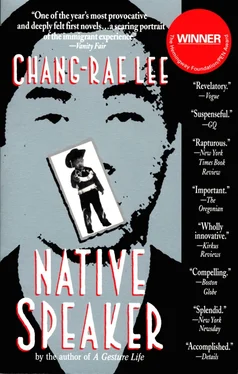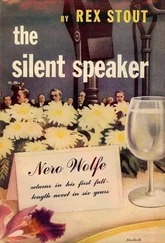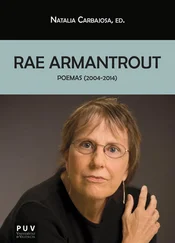“Okay. But why not Sherrie?”
“Sherrie doesn’t need to know this. Believe me. I’m protecting her. She’ll thank me later. I’m protecting everybody.”
She didn’t say anything more than that. She flipped to a new page on her legal pad and began scribbling half-sentences. She quickly filled two sheets. I thought at first that she might be trying to hide something from me, bending over the page so, to use somehow the hard fact for her own direct gain. But then she straightened and what I could read glancing over at her notes made it clear that she was plotting for John Kwang alone. She was being a good soldier. She was brainstorming ideas on how to leak something that wasn’t hers in the first place. The ideas ranged wildly in practicality and sensibility: call a television news station or a newspaper with a tip; hire a photographer to take pictures of them together; take the pictures yourself; offer the girl money to talk; get some neighborhood kids to slash his call car’s tires; trip the fire alarm in her building when he’s there; set a real fire; get her arrested; tell De Roos straight out that we have dirt on him and will use it if he ever plays rough.
I figured, too, that what she meant by protection was to put up what staffers called a “Chinese wall” between a release of the information and anyone else high up in the Kwang office, Sherrie Chin-Watt or Jenkins. John Kwang, without mention, would never know of it. I would soon learn that this was typical, that any political life was made up of minor battles and skirmishes, opportunities on the edge of the front discovered or sometimes created by people like Janice Pawlowsky. John Kwang, evidently, had come to trust her judgment and loyalty and willingness to sacrifice herself. It was only later that I fully understood the depth of his trust in the people working under him. I, finally, would prove his trust wrong. And that was the strangeness for me, that someone like Janice, with all her attendant cynicism and ambition, could believe in another person so singularly, that she could shelter her candidate, her man for office, and step in front of angry bullets shot from his opponents or the press.
We kept on scouting neighborhoods for homeless shelters, community centers, training schools, drug rehabilitation clinics, halfway houses. Sites where he might be seen in the coming months. Photo ops. She made me stop several more times. Our last stop, toward dusk, was an abandoned tenement building beside an elevated ramp of the Brooklyn Queens Expressway. She had me get out and stand on the crumbling steps. Then she rambled across the street and peered back at me through her palm-sized director’s viewfinder.
“Hold your hand out, like you’re shaking with somebody!”
I extended both, like Kwang in our file photos at the office.
“Good! Now go inside the archway and come out!”
I stepped back into the entrance. The walls of the lobby were badly damaged, unsheathed layers of wire and wood and corrugated paper hanging out of gouges in the plaster. The tiled floor was mostly shattered and broken through in places down past the joists. I could see into the basement where mangled parts of children’s bicycles lay in dusty heaps.
“Come on out! Slowly, slowly.”
I walked out in the light of breaking clouds. I lifted my face to the sky, as commanded. She told me to raise my arms in victory. So I did.
“Freeze,” she said. “Awesome.”
Our boy, Mitt, was exactly seven years old when he died, just around the age when you start really worrying about your kid. Then, you look long at his tender arms and calves and you wish you could keep him inside the house for the next ten years, buckled up and helmeted. But all of a sudden, more than you know, he’s outside somewhere, sometimes even alone, crossing the streets, scaling rocks, wrestling with dogs, swimming in pits, getting into everything mechanical and combustible and toxic. You suddenly notice that all of his friends are wild, bad kids, the kind that hold lighted firecrackers until the very last second, or torment the neighborhood animals. Mitt, the clean and bright one — somehow, miraculously, ours — runs off with them anyway, shouting the praises of his perfect life.
From the time he was four we spent whole summers up at my father’s house in Ardsley, mostly so Mitt could troop about on the grass and earth and bugs — the city offering only broken swings and dry swimming pools — and Lelia and I seemed to share an understanding of what would be safest and most healthful for him.
My father would call me each year a few days before Memorial Day and say as if he didn’t really care, Ya, oh-noon-guh-ya? and I would answer him and say yes, we were coming again this summer, and he could get things ready for us.
The city, of course, seemed too dangerous. Especially during the summer, the streets so dog mad with heat, untempered, literally steaming with possibilities, none of them good. People got meaner, stuck beneath all that hard light and stone. They worked through it by talking, speaking, shouting and screaming, in every language on earth. And the cursing: in New York City, summer is the season of bad language. It shouts at you from propped-up windows, it hangs on gold chains out of cars, it lingers at phone booths, peep booths, in every standing line for movies and museums and methadone.
And then there were the heat waves, the crime waves. The clouds of soot and dust. In the evening it all descended unseen, an invisible ash of distant fires, soiling us everywhere.
So escape. Rent a car, pack it up, drive right into the heart of dreamland. Here, it went by names like Bronxville, Scarsdale, Chappaqua, Ardsley. The local all-stars.
We wanted our boy to know a cooler, softer ground. On the expansive property of my father’s house stood high poplar, oak, the few elm not yet fallen with disease. They didn’t appear much different to me than they did twenty years before; they looked just as tall, as venerable, the capital of my father’s life. And there would wend Mitt, the child of ceaseless movement, leafy stick in hand, poking beneath the shady skirts of the trees for the smallest signs of life.
Lelia and I would watch him from the back patio. My father slept in the sun with a neon-orange golf cap pulled down over his eyes. Sometimes he spoke from beneath it, his weary Korean mumbling, and I could only read the embroidery of the word Titleist in place of actually understanding him. Mitt would shout for us from the trees, holding up something too small to see. My father would groan in acknowledgment, lowing the refrain of my youth. Yahhh . Mitt, unconcerned, hopped a little dance, his patented jig, waving madly, legs pumping. We waved back. I shouted to him, too loud.
He brought back rocks to us. Dead insects. Live slugs, green pennies, bits of faded magazines. Every kind and condition of bark. Stuff, he said. He arranged them carefully next to my father’s chaise like trinkets for barter, all the while recounting to himself in a small voice the catalogue of his suburban treasure. He offered the entire lot to my father.
“I give you a dollar,” my father said to him.
“Two!” Mitt cried.
“Lucky silver dollar,” the old man countered, as if luck had meant anything in his life.
“The one on your desk?”
“You go get it now,” he said, pointing up to the top window of the house.
Mitt liked to carry the coin with him. I knew because he would produce it wherever we were and start rubbing the face with his thumb. My father must have advised him so, told him some Bronze Age Korean mythology to go with it, the tale of a lost young prince whose magic coin is sole proof of his rightful seat and destiny.
A week after the accident, when the nurse at the hospital desk gave me the plastic bag of his clothes, I found the coin in the back flap pocket of his shorts. The coin was warm — the bag must have been left near a window — and I wondered how long the shiny metal could hold in a heat, if it could remember something like the press of flesh.
Читать дальше












